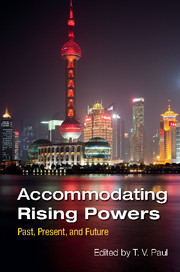14 - Great power accommodation and the processes of international politics
from Part IV - Conclusions
Published online by Cambridge University Press: 05 March 2016
Summary
On March 18, 2014, close to 100 years after it began, World War I (WWI) claimed two more lives when long-buried munitions exploded on a farm near Ypres. The echoes of failure to achieve peaceful change in international politics are still with us. They remind us of the urgent need to get the current and future problems of international change right.
Rising powers pose about as big a question as there is in IR theory, and the answers usually offered are big too. They focus on the structural features of international politics: its great power hierarchies and its grand institutional orders. From one point of view, changes to global power hierarchies lead inexorably to clashes between the hegemon and the most powerful rising state. From another, the institutions, norms, and rules established under American primacy, whether because they serve the common interest or because rising powers have been socialized to accept them, might be robust enough to persist into a multipolar world.
In contrast to both grand stories, this book focuses on the processes and strategies of international politics. It locates the drivers of accommodation and conflict among specific conflicts of interest that emerge among multiple powers, the dilemmas and challenges of bargaining to resolve these conflicts of interest, and states’ capacities to overcome these challenges.
On a theoretical level, then, this book focuses our attention on the processes and strategies of international politics. As T.V. Paul argues in Chapter 1, “major states do have maneuverability within the limits of the semi-anarchic structure [of world politics], and…can avert cataclysmic wars by devising effective grand strategies of change.”
The book's arguments affect the precepts of each of the three theoretical traditions outlined by Chapter 1. Realist accounts of power changes should not work from structure alone, but should discuss instead how states mediate structural changes in international politics through specific military threats and bargaining processes. Liberal approaches, long focused on the comparative statics of liberal orders, could fruitfully investigate the problem of how to negotiate over changes to existing rules. That is, if we accept that liberal rules help in the peaceful mediation of state behavior, how then can challenges to those rules themselves be resolved peacefully? This volume explores the institutional flexibility and broader engagement necessary to resolve this paradox. Finally, constructivist accounts can be quite productive in moving past top-down, system-to-state socialization processes.
- Type
- Chapter
- Information
- Accommodating Rising PowersPast, Present, and Future, pp. 293 - 313Publisher: Cambridge University PressPrint publication year: 2016



